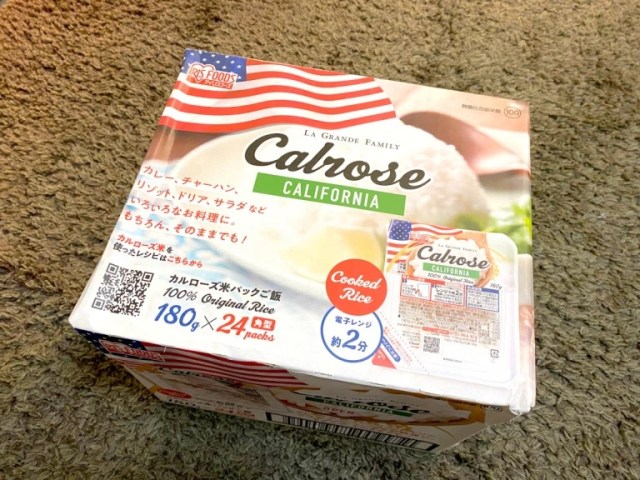
His friend warned him about Calrose rice. Should he have listened?
As someone born and raised in Japan, our Japanese-language reporter P.K. Sanjun eats a lot of rice. And while his favorite way to eat it is, of course, fresh out of the rice cooker, like a lot of Japanese people he also likes to keep a few microwavable rice packs in his apartment, just in case he doesn’t have time to cook a pot of grains before hunger hits.
So on his most recent trip to Costco, P.K. was looking to pick up some rice packs, when he came across a variety he’d never noticed before.
As you can probably guess from the American flag, Calrose rice isn’t grown in Japan, and the first part of its name comes from “California,” the West Coast American state where it is grown. P.K. was a little worried, though, because even though he’s never eaten Calrose rice himself, he has a Japanese friend who’s currently living in the U.S., and said friend wasn’t impressed when he tried it.
“I’d rate it as thoroughly mediocre, or maybe below-average,” P.K.’s friend had told him. “I buy THE MOST expensive rice you can get here, the Tamaki Gold, and Calrose is a lot cheaper. Don’t compare it to Japanese rice. When I go back to Japan, even the average rice tastes so good to me.”
Not exactly the most glowing endorsement, but then again, they say there’s no accounting for personal taste. P.K. felt a little reassured when he saw that Costco’s Calrose rice packs are specifically produced for Iris Ohyama, a Japanese trading company, since it suggested that at least someone at the company thought Calrose rice would be pleasing to Japanese people’s palates.
But what really sealed the deal was the price. The Calrose rice packs come in a 24-pack box for 1,498 yen (US$13.15). That works out to just about 62 yen each, which is an amazingly cheap price for rice packs in Japan. With each pack having 180 grams (6.3 ounces) of rice, he’d be getting 4.32 kilos for 1,498 yen, pretty much about the same price as he’d pay for a sack of rice in a Japanese supermarket of that size that he’d have to go through the trouble and time of cooking.
So P.K. took the plunge and bought the box, figuring that if the Calrose rice really did taste all that bad, he could just feed the remaining packs to Mr. Sato or something.
Doing a little online research on his way home, P.K. learned that Calrose is a medium-grain Japonica rice, and the Japanese-language website of the USA Rice Foundation describes it as something of a midpoint between Japan’s domestic short-grain varieties and the long-grain Thai-style jasmine rice that also has a lot of fans in Japan.
After tearing back a corner of the wrapping to the dotted line, P.K. popped the pack in the microwave for two minutes, then grabbed his chopsticks for the tasting…
…and it took exactly one bite for P.K. to learn that he and his friend have some very different opinions about rice. “Calrose rice isn’t bad at all!” P.K. says. “It’s honestly really good! It’s a touch on the airy side, but it has a nice, subtle sweetness. I don’t know if I’d want to just eat a bowl of it by itself with nothing else, but there’s no way you can say it tastes bad. It’d be a great rice to use with curry, and even though the grains are longer than Japanese rice, it’s not really something you notice very much while you’re chewing.”
On the 1-to-5 P.K. scale, the Calrose rice packs get near-perfect 4s in both the “I’d recommend this” and “I’d buy this again” categories. “The flavor is above and beyond ‘OK,’ and taking the price into account, these might be the best possible rice packs to keep on hand,” he says.
So all in all, a much smarter choice than that giant chocolate egg P.K. got on one of his previous Costco runs.
Photos ©SoraNews24
● Want to hear about SoraNews24’s latest articles as soon as they’re published? Follow us on Facebook and Twitter!
[ Read in Japanese ]
Follow Casey on Twitter as he continues to try to pull California and Japan closer to each other.

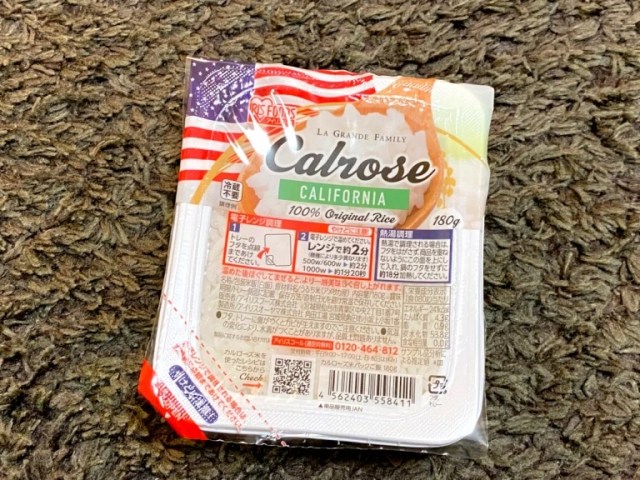
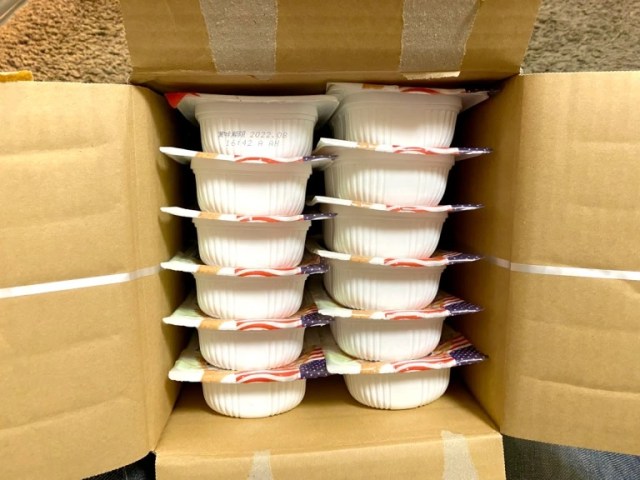
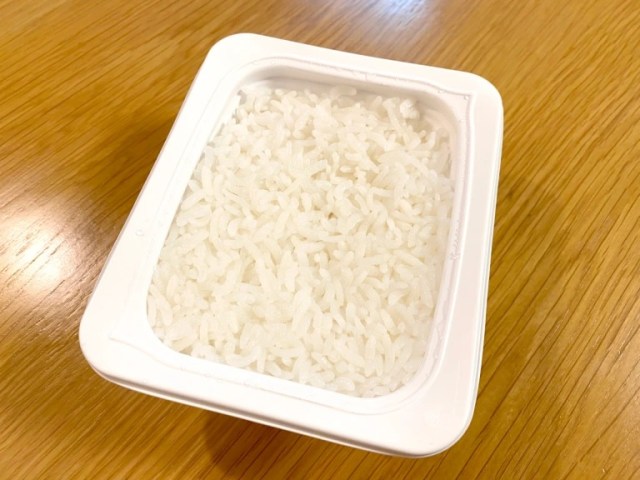
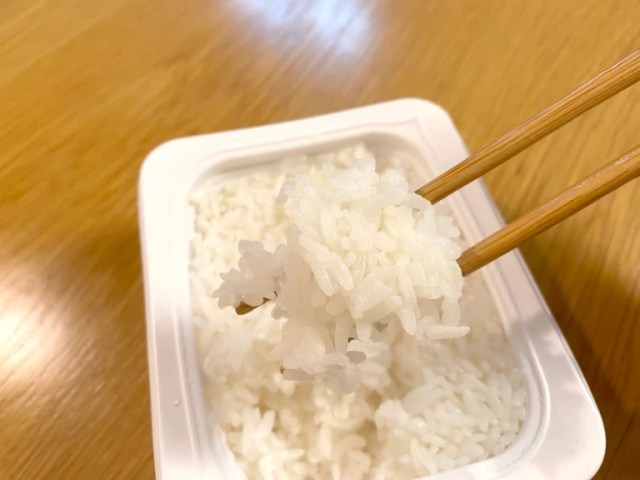
 With Japanese rice prices going crazy, can California rice win over our Japanese taste-testers?
With Japanese rice prices going crazy, can California rice win over our Japanese taste-testers? Our Japanese reporter visits Costco in the U.S., finds super American and very Japanese things
Our Japanese reporter visits Costco in the U.S., finds super American and very Japanese things Go shopping with our Japanese reporter as he experiences Costco in the U.S. for the first time
Go shopping with our Japanese reporter as he experiences Costco in the U.S. for the first time Edible culture shock: Our Japanese reporter tries American barbecue for first time【Taste test】
Edible culture shock: Our Japanese reporter tries American barbecue for first time【Taste test】 Costco Japan’s brothless ramen grabs our attention, but will it win our heart?【Taste test】
Costco Japan’s brothless ramen grabs our attention, but will it win our heart?【Taste test】 Starbucks Japan releases first-ever Hinamatsuri Girls’ Day Frappuccino
Starbucks Japan releases first-ever Hinamatsuri Girls’ Day Frappuccino Japan Extreme Budget Travel! A trip from Tokyo to Izumo for just 30,000 yen [Part 2]
Japan Extreme Budget Travel! A trip from Tokyo to Izumo for just 30,000 yen [Part 2] Japan Extreme Budget Travel! A trip from Tokyo to Izumo for just 30,000 yen [Part 1]
Japan Extreme Budget Travel! A trip from Tokyo to Izumo for just 30,000 yen [Part 1] Which convenience store onigiri rice balls are the most popular? Survey reveals surprising results
Which convenience store onigiri rice balls are the most popular? Survey reveals surprising results Tokyo street sweets: The must-snack treats of Nakano’s Refutei
Tokyo street sweets: The must-snack treats of Nakano’s Refutei Host club royalty Roland demonstrates his night-time routine, claims it’s not dissimilar to yours
Host club royalty Roland demonstrates his night-time routine, claims it’s not dissimilar to yours This is Japan’s only shrine with a Shinkansen tunnel underneath it
This is Japan’s only shrine with a Shinkansen tunnel underneath it 7-Eleven Japan’s sakura sweets season is underway right now!
7-Eleven Japan’s sakura sweets season is underway right now! Can you eat lunch in Tokyo for less than 500 yen?
Can you eat lunch in Tokyo for less than 500 yen? Asics Ukiyo-e x Manga sneakers combine modern and traditional Japan for Tokyo Marathon 2021
Asics Ukiyo-e x Manga sneakers combine modern and traditional Japan for Tokyo Marathon 2021 Highest Starbucks in Japan set to open this spring in the Tokyo sky
Highest Starbucks in Japan set to open this spring in the Tokyo sky The 10 most annoying things foreign tourists do on Japanese trains, according to locals
The 10 most annoying things foreign tourists do on Japanese trains, according to locals Tokyo Skytree turns pink for the cherry blossom season
Tokyo Skytree turns pink for the cherry blossom season Yakuzen ramen restaurant in Tokyo is very different to a yakuza ramen restaurant
Yakuzen ramen restaurant in Tokyo is very different to a yakuza ramen restaurant Shibuya Station’s Hachiko Gate and Yamanote Line stairway locations change next month
Shibuya Station’s Hachiko Gate and Yamanote Line stairway locations change next month Starbucks Japan releases new sakura goods and drinkware for cherry blossom season 2026
Starbucks Japan releases new sakura goods and drinkware for cherry blossom season 2026 Starbucks Japan adds new sakura Frappuccino and cherry blossom drinks to the menu
Starbucks Japan adds new sakura Frappuccino and cherry blossom drinks to the menu Japan’s new “Cunte” contact lenses aren’t pronounced like you’re probably thinking they are
Japan’s new “Cunte” contact lenses aren’t pronounced like you’re probably thinking they are Japan’s newest Shinkansen has no seats…or passengers [Video]
Japan’s newest Shinkansen has no seats…or passengers [Video] Foreigners accounting for over 80 percent of off-course skiers needing rescue in Japan’s Hokkaido
Foreigners accounting for over 80 percent of off-course skiers needing rescue in Japan’s Hokkaido Super-salty pizza sends six kids to the hospital in Japan, linguistics blamed
Super-salty pizza sends six kids to the hospital in Japan, linguistics blamed Starbucks Japan unveils new sakura Frappuccino for cherry blossom season 2026
Starbucks Japan unveils new sakura Frappuccino for cherry blossom season 2026 Foreign tourists in Japan will get free Shinkansen tickets to promote regional tourism
Foreign tourists in Japan will get free Shinkansen tickets to promote regional tourism Take a trip to Japan’s Dododo Land, the most irritating place on Earth
Take a trip to Japan’s Dododo Land, the most irritating place on Earth Naruto and Converse team up for new line of shinobi sneakers[Photos]
Naruto and Converse team up for new line of shinobi sneakers[Photos] Is China’s don’t-go-to-Japan warning affecting the lines at a popular Tokyo gyukatsu restaurant?
Is China’s don’t-go-to-Japan warning affecting the lines at a popular Tokyo gyukatsu restaurant? Survey asks foreign tourists what bothered them in Japan, more than half gave same answer
Survey asks foreign tourists what bothered them in Japan, more than half gave same answer Japan’s human washing machines will go on sale to general public, demos to be held in Tokyo
Japan’s human washing machines will go on sale to general public, demos to be held in Tokyo Starbucks Japan releases new drinkware and goods for Valentine’s Day
Starbucks Japan releases new drinkware and goods for Valentine’s Day We deeply regret going into this tunnel on our walk in the mountains of Japan
We deeply regret going into this tunnel on our walk in the mountains of Japan Studio Ghibli releases Kodama forest spirits from Princess Mononoke to light up your home
Studio Ghibli releases Kodama forest spirits from Princess Mononoke to light up your home Major Japanese hotel chain says reservations via overseas booking sites may not be valid
Major Japanese hotel chain says reservations via overseas booking sites may not be valid Put sesame oil in your coffee? Japanese maker says it’s the best way to start your day【Taste test】
Put sesame oil in your coffee? Japanese maker says it’s the best way to start your day【Taste test】 No more using real katana for tourism activities, Japan’s National Police Agency says
No more using real katana for tourism activities, Japan’s National Police Agency says Our reporter gets stuck into some ‘Meat Curtain’ beef sukiyaki in Tokyo
Our reporter gets stuck into some ‘Meat Curtain’ beef sukiyaki in Tokyo Sriracha vending machines rising in Japan, our reporter tries it for first time (with Cup Noodle)
Sriracha vending machines rising in Japan, our reporter tries it for first time (with Cup Noodle) Our Japanese reporter’s experience with crawfish in the US left him stunned
Our Japanese reporter’s experience with crawfish in the US left him stunned Does Japan owe one of its favorite foods to a bookstore owner? Trying the “original” Hayashi rice
Does Japan owe one of its favorite foods to a bookstore owner? Trying the “original” Hayashi rice Our Japanese-born reporter gets some culture shock at Mexico City’s most popular sushi chain
Our Japanese-born reporter gets some culture shock at Mexico City’s most popular sushi chain Shakey’s American Pizza Tour totally ruins our Japanese reporter
Shakey’s American Pizza Tour totally ruins our Japanese reporter Taco rice at Japanese beef bowl chain Sukiya proves you can never eat a bad taco rice
Taco rice at Japanese beef bowl chain Sukiya proves you can never eat a bad taco rice Why hayashi rice should be your last meal before leaving Japan
Why hayashi rice should be your last meal before leaving Japan Is a sandwich “bread?” Our reporter refuses to let survey results stand
Is a sandwich “bread?” Our reporter refuses to let survey results stand We ate all eight kinds of cold noodles from 7-Eleven and here’s our favourites【Taste test】
We ate all eight kinds of cold noodles from 7-Eleven and here’s our favourites【Taste test】 Instant vs. Restaurant Ramen Project: Ippudo spicy miso tonkotsu battle【Taste test】
Instant vs. Restaurant Ramen Project: Ippudo spicy miso tonkotsu battle【Taste test】 RocketNews24’s giant teddy bear goes looking for some new friends at Costco Japan 【Photos】
RocketNews24’s giant teddy bear goes looking for some new friends at Costco Japan 【Photos】 Taste testing 7-Eleven Japan’s five frozen curries to see which ones nail it
Taste testing 7-Eleven Japan’s five frozen curries to see which ones nail it Our reporter tries nuikatsu for the first time, but is he too old for this otaku lifestyle hobby?
Our reporter tries nuikatsu for the first time, but is he too old for this otaku lifestyle hobby? This Kobe Beef croquette currently has a 35-year waitlist…So is it worth it?【Taste Test】
This Kobe Beef croquette currently has a 35-year waitlist…So is it worth it?【Taste Test】